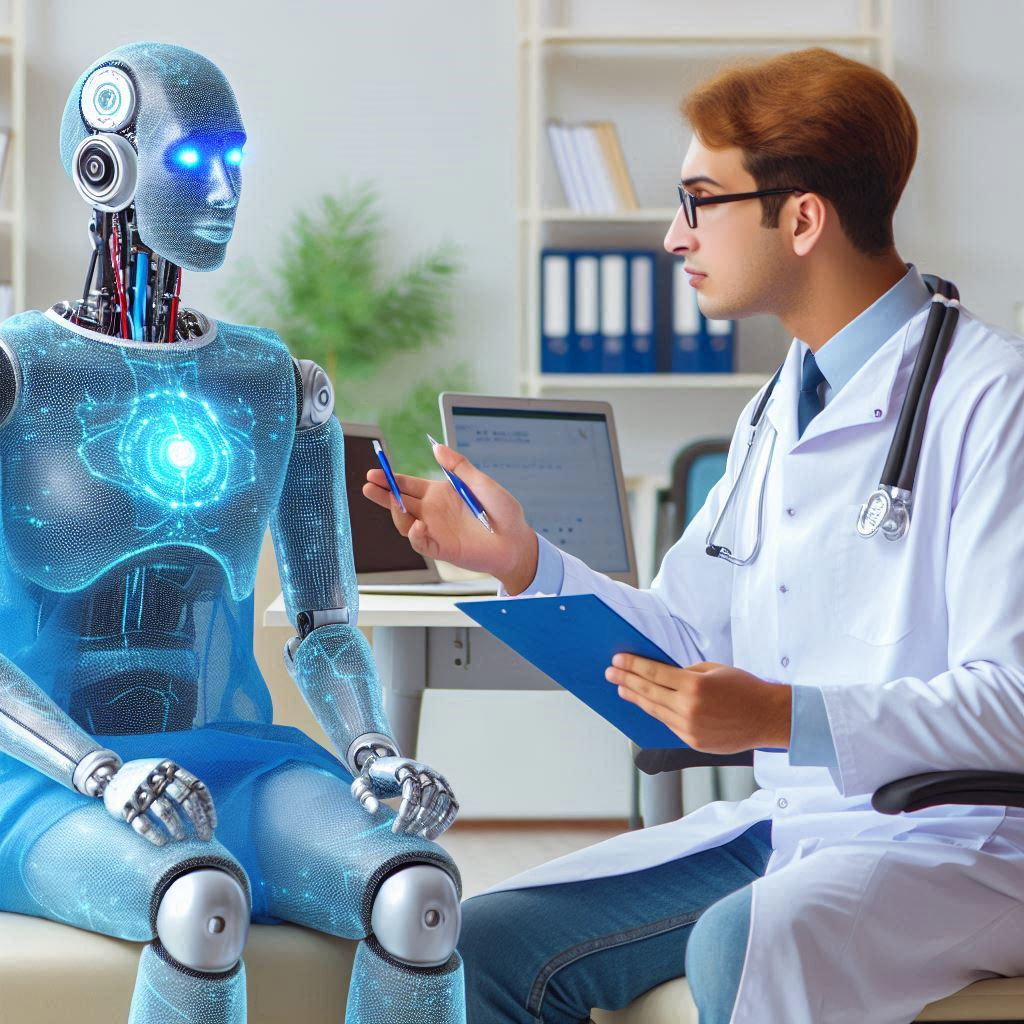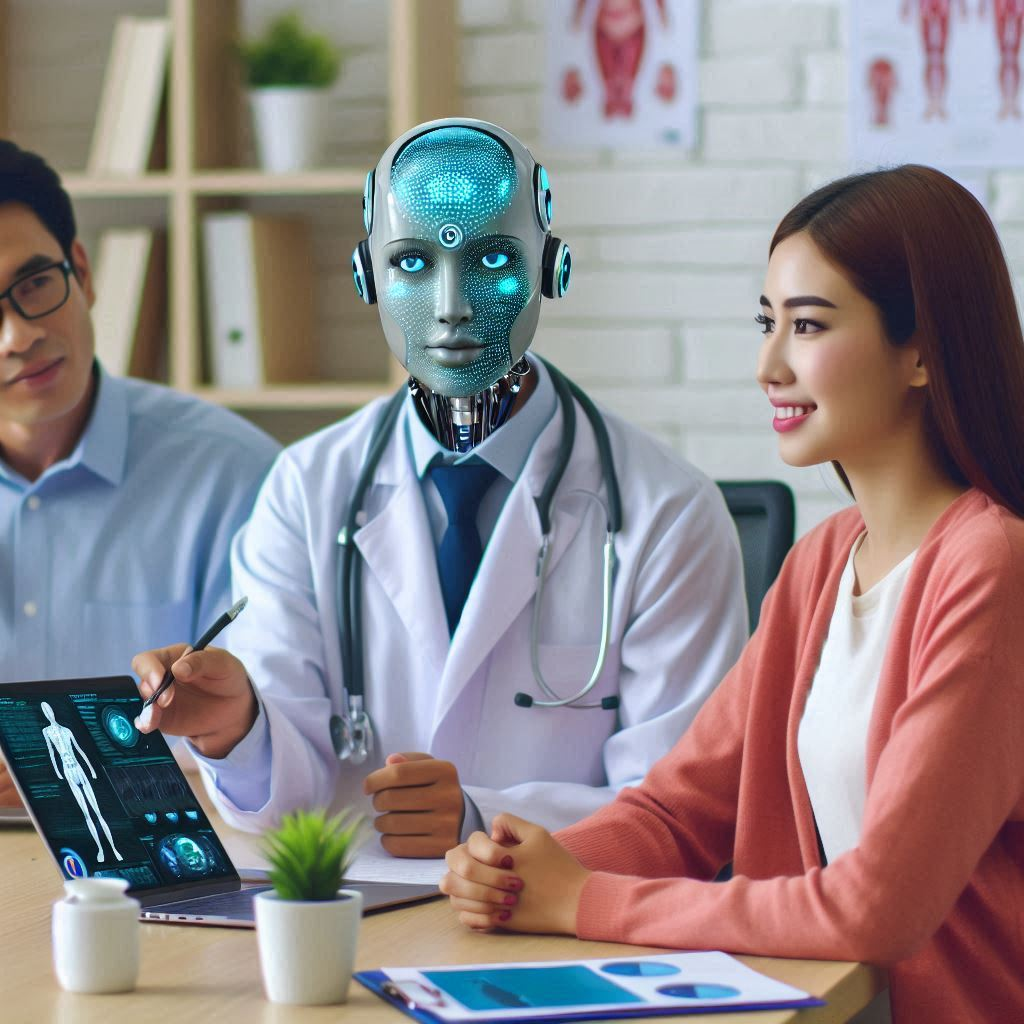Table of Contents
Introduction
Overview of AI in Healthcare
AI powered healthcare system review large amount of medical data to improve the accuracy of diagnostics, modify treatments, and optimize operations. It helps in improving health imaging to increasing the discovery of medicines, AI is playing a very important role in modern medicines. Artificial intelligence (AI) is changing healthcare systems very quickly through the use of technologies like machine learning, natural language processing, and robotics.
Importance of AI in Modern Medicine
Healthcare needs AI for various reasons :-
Advanced Diagnostics: AI improves the quality of diagnostic and imaging in medicine.
Personalized Care: Customizes care for each patient according to their data.
Operational Efficiency: Improves facilities management and automates administrative procedures. Early detection of symptoms of diseases and possible health problems is possible with predictive analytics.
Drug discovery with the help of AI speeds up the process of creating new and better medicines.
AI Applications in Healthcare
Imaging and Diagnosis
Artificial Intelligence in Medical Imaging (e.g., MRI, CT scans): By checking images to identify problems, AI algorithms improves the accuracy of medical imaging. In order to diagnose diseases like diabetic retinopathy and macular degeneration due to age, for example, Google Health’s DeepMind AI systems have built retinal scan analysis algorithms that, in many cases, beats human radiologists in accuracy.
Early Diagnosis and diagnosis (e.g., Cancer Detection): By analyzing patterns in data, AI helps in early disease diagnosis. For example, PathAI improves early cancer diagnosis and allows rapid treatment by using machine learning to help pathologists identify dangerous cells in biopsy samples.
Personalized Medicine
Customizing Therapy Using Genetic Data: AI evaluates genetic data to provide specific therapy plans. IBM Watson for Oncology helps physicians to select the best course of action required for each patient by analyzing its genetic and clinical data to provide detailed cancer treatments based on a patient’s genetic profile.
Drug Development and Discovery: AI speeds up drug development by predicting how medicines will interact with biological systems. Using its AI platform, BenevolentAI was able to quickly identify interesting medication candidates by analyzing large datasets in order to find an affordable treatment for ALS.
Patient Monitoring and Management
Wearable Technology and Remote Monitoring: Wearable devices with use of artificial intelligence monitor the health conditions of patient and offers them immediate feedback. Artificial intelligence is used by different companies like Fitbit and Apple Watch etc. to track and store different kind of heart rhythms, identify variations, and notify users and medical professionals about possible health problems.
AI is also helpful in the Management of Chronic Diseases: By analyzing different patient data and providing them with detailed and specific recommendations, chronic diseases are also be monitored and treated with the help of artificial intelligence. Livongo is one of the very good example that offers a platform that helps diabetic patients manage their diabetes and improve their treatment by tracking blood glucose levels and using artificial intelligence (AI) to provide specific suggestions and treatments.
Administrative and Operational Efficiency
Hospital Operations Streamlining: AI improves hospital operations by performing administrative duties automatically. Healthcare providers are able to focus more on patient care because to Qventus’s use of AI to manage patient flow, improve hospital workflows, and cut down on operational errors.
Improving Patient Scheduling and Administration: AI-powered scheduling platforms facilitate better patient appointment scheduling. AI is used by Zocdoc to improve appointment scheduling, forecast patient absences, and speed the booking process—all of which improve patient satisfaction and productivity.

Case Studies and Real-World Examples
1.) AI in Radiology
AI has improved medical imaging speed and accuracy, which very rapidly changed radiology. The application of AI algorithms to diagnose diseases like lung cancer or fractures using CT or X-ray images is one excellent example. For example, DeepMind at Google has created an AI system that uses retinal scans to identify more than 50 different eye illnesses. By highlighting potential issues for more examination, artificial intelligence in radiology helps radiologists in making early diagnosis and improving patient outcomes. Also, radiologists’ burden reduces as a result, allowing them up to concentrate on more complicated situations.
2.) AI in Predictive Analytics for Patient Care
Proactive healthcare is made possible by predictive analytics, which uses AI to analyze patient data and predict possible health effects. Hospitals using AI to identify patients at risk of septic or readmission is one of the very popular example. Cleveland Clinic’s use of an AI-based system to predict patients’ heart failure is one the example of a successful implementation. Artificial intelligence (AI) systems can lower hospital expenses and improve patient care quality by predicting problems or suggesting preventative steps based on analysis of patient records and health data.
3.) Innovative Startups and Companies: Highlighting Leading Companies in AI Healthcare
There are various companies which are improving and using AI in healthcare, they are promoting and leading innovation which lead to improving patient care:
Tempus: They focuses on AI-driven precision medicine, it utilizes clinical and biological data analysis to customize therapies for cancer patients.
Zebra Medical Vision: This is kind of technology that analyzes medical images using different artificial intelligence algorithms, which helps radiologists to identify the diseases including cancer, liver, and cardiovascular issues.
Babylon Health: It is a UK-based firm that combines artificial intelligence (AI) and telemedicine. Users can monitor symptoms and then chat with healthcare specialists through a smartphone app. These businesses are advancing and improving the use of AI in healthcare to improve treatment outcomes and diagnoses together.
Challenges and Limitations
1.) Data Privacy and Security Concerns
Healthcare AI systems use a lot of sensitive patient data, which causes privacy and security issues. Privacy rules such as HIPAA could be broken by improper handling or data breaches that allow for unauthorized access to or misuse of personal health information. In order to address these concerns, it is important to ensure data encryption, secure storage, and proper consent.
2.) Combining with Current Systems
Electronic Health Records (EHRs) are one of the example of a legacy healthcare system that AI tools often find difficult to smoothly integrate with. Significant problems include need for staff training, high implementation costs, and compatibility issues. For integration to be effective, procedures must be modified, and AI systems have to interact peacefully with present technologies.
3.) Accuracy and Reliability of AI Models
The quality of the AI models depends on the dataset used to train them. Incorrect or biased data can result in incorrect treatment recommendations, misdiagnoses, and wrong predictions in the healthcare industry. Improving AI’s reliability and accuracy in healthcare contexts requires constant model validation and high-quality, expanded datasets.
Future Trends & Developments
Emerging Technologies of AI in Healthcare
1.) AI in Drug Discovery
By analyzing massive databases to find interesting compounds, forecast the effectiveness of therapies, and cut down on the length and expense of clinical trials, artificial intelligence is speeding up the discovery of new drugs. AI is being used by businesses like BenevolentAI and Insilico Medicine to speed up the development of new treatments, particularly for complicated illnesses like cancer and neurological disorders.
2.) AI in Remote Patient Monitorings
Real-time monitoring of patients’ vital signs, including blood pressure, glucose levels, and heart rate, is made possible by wearables and sensors driven by AI. These gadgets employ artificial intelligence (AI) to spot patterns, predict possible health problems, and notify medical professionals to take action before things become worse. Hospital admissions are decreased and chronic disease management improved remote monitoring.
3.) AI in Personalized Treatment Plans:
Through the analysis of patient data, medical history, and genetic information, AI is becoming very important in the customization of treatment programs. Based on predicted patient reactions to treatments, AI algorithms can suggest individualized treatment plans, improving outcomes for diseases including cancer, diabetes, and cardiovascular disorders.
AI in Genomics
By reviewing large genetic datasets to find out the patterns, mutations, and disease indicators, artificial intelligence is transforming bioinformatics. The identification of genetic traits to diseases such as cancer and heart disorders is made easier by this technology. By predicting genetic reactions to medicines, artificial intelligence (AI) helps in the discovery of novel pharmaceuticals and allows personalized medicine, where treatments are customized based on a patient’s genetic composition.
AI-Driven Robotics in Surgery
Robotic devices powered by AI are improving surgical accuracy and safety. These robots boost precision in surgeries that are manually very difficult and provide surgeons with real-time data support. Future surgical robots might do increasingly independent tasks as artificial intelligence develops, which will lower surgical error and enhance surgical results. AI-driven robotics could lead to simpler, quicker, and more effective recovery processes.
Conclusion
Summary of Key Points
AI in healthcare is transforming healthcare and diagnostic in many ways, from making more detailed and specific therapies for improving diagnostics. Predictive analytics, robotic surgery, genetics, and radiology are among the fields where AI is being used effectively. However, several obstacles remain, including but not limited to data privacy issues, system integration, and the requirement for governmental supervision. AI is becoming more and more important in the medical industry thanks to emerging technologies like remote patient monitoring, medical imaging, and AI-driven drug discovery.
The Future Outlook for AI in Healthcare
AI in healthcare has a bright future ahead of it, with more developments in automated surgery, precision medicine, and quicker drug development anticipated. AI technology will probably improve patient outcomes, improve healthcare procedures, and increase accessibility to therapies as they advance in intelligence.
Frequently Asked Questions(FAQ’s)
1.) What is AI in healthcare?
AI in healthcare involves the use of AI technologies, including robotics, machine learning, and natural language processing, in order to improve patient care, diagnosis, and treatment.
2.) How is AI being used in healthcare today?
AI in healthcare is helpful in many fields, such as virtual health assistants, robotic surgery, customized medicine, advanced analytics for patient care, and medical imaging for illness detection.
3.) What are the benefits of AI in healthcare?
AI reduces human error and improves results by enhancing diagnostic accuracy, faster discovery of medicines, offering personalized therapies, improving patient monitoring, and enabling more effective healthcare delivery.
4.) What challenges does AI face in healthcare?
While using AI in healthcare the main challenge is of managing ethical and legal difficulties, ensuring the accuracy and reliability of AI models, integrating with current healthcare systems, and dealing with data privacy and security concerns are some of the challenges.
5.) Can AI in healthcare fully replace doctors in the future?
While AI is not expected to replace doctors, it will support them in their profession by giving them access to tools that will improve diagnosis, treatment, and decision-making. In the medical field, clinical judgment and personal touch are still important.

Its really very informative I feel amazed to see the advancement in healthcare field by the help of AI.
🌊 Your ideas flow like liquid music! Sprunki Game captures that fluidity perfectly.
Captivating discovery! Have you tried AI Tools? It’s a delightful blend of innovation and efficiency!